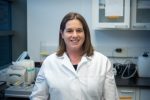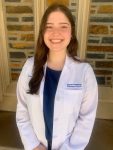Below you will find details on our program alumni. For a comprehensive list of our graduates, please click HERE.
Feel free to search for and reach out to ITEHP alumni via LinkedIn or reach out to Joel or Jessica for an introduction.
Alicia R Timme-Laragy, PhD

PhD Program: Environment (2007)
Faculty Advisor: Richard Di Giulio, PhD
Dissertation: Mechanisms of synergistic developmental toxicity of polycyclic aromatic hydrocarbons in zebrafish (Danio rerio)
Updates 2/2024
Employment: Professor of Environmental Health Science, University of Massachusetts Amherst
Employment Sector: Academia
After earning her doctoral degree from Duke University in 2007, Alicia worked as a postdoctoral fellow/scholar at Woods Hole Oceanographic Institution with mentor Mark Hahn, PhD. She began her career at the University of Massachusetts Amherst, Department of Environmental Health Sciences, School of Public Health and Health Sciences in 2013, and is currently a professor there. Dr. Timme-Laragy’s laboratory uses the zebrafish embryo and cell culture models to study mechanisms of oxidative stress and antioxidant defenses during embryonic development, with a focus on the pancreas.
Allison Phillips (Flynn), PhD

Pronouns: she / her / hers
PhD Program: Environment (2019)
Faculty Advisor: Heather Stapleton, PhD
Dissertation: Exposure, Metabolism, and in Vitro Effects of Isopropylated and Tert-butylated Triarylphosphate Ester (ITP & TBPP) Flame Retardants and Plasticizers
Updates 9/2020
Employment: Toxicologist, U.S. Environmental Protection Agency
Employment Sector: Government
After graduating in 2019, Alli joined the Risk Assessment and Natural Resources Division of Arcadis, a global consulting firm. As a Staff Toxicologist at Arcadis, she worked on projects including site-specific risk assessments, the tracking and review of new chemical regulations and hazard derivation methods, exposure assessments and product stewardship evaluations. Alli then became an ORISE postdoctoral fellow at the U.S. Environmental Protection Agency in the Advance Analytical Chemistry Methods Branch. There, she worked on prioritizing bioactive and bioaccumulative components of complex mixtures via effect directed analysis and high resolution mass spectrometry, developing a comprehensive checklist for evaluating the quality of non-target analysis studies, identifying chemical indicators of non-chemical stressors in house dust, and laying the framework for the use of non-target analysis in rapid response scenarios. She is now a federal Toxicologist in the Toxic Effects Assessment Branch at EPA, where she derives Provisional Peer-Reviewed Toxicity Values.
Chrissy (Figan) Crute, PhD

Pronouns: she / her / hers
PhD Program: Environment (2022)
Faculty Advisors: Susan Murphy, PhD; Liping Feng, MD
Dissertation: The Effects of Per- and Polyfluoroalkyl Substances During Pregnancy on Maternal and Fetal Health
Casey Lindberg, PhD

Pronouns: she / her / hers
PhD Program: Environment (2019)
Faculty Advisor: Richard Di Giulio, PhD
Dissertation: The Impacts of Embryonic Polycyclic Aromatic Hydrocarbon and Hypoxia Co-Exposures on Two Model Fish Species
Updates 9/2020
Employment: Biologist, U.S. Environmental Protection Agency
Employment Sector: Government
Casey graduated from Duke in May 2019. After graduation, she accepted an Oak Ridge Institute for Science and Education (ORISE) postdoctoral fellowship in Washington, D.C., with the U.S. EPA in the Office of Water (OW). Casey’s fellowship research focused on adverse health effects that result from exposures of chemical contaminants through drinking water. In the summer of 2020, Casey accepted a full-time Biologist position with OW in the Human Health Risk Assessment Branch of the Office of Science & Technology. Currently, her projects revolve around EPA’s drinking water regulations and water quality standards/criteria; Casey evaluated data from toxicity studies and health assessments to help inform risk assessment and regulatory activities related to drinking and recreational waters of the U.S.
Daniel Brown, PhD

Pronouns: he/ him / his
PhD Program: Environment (2015)
Faculty Advisor: Richard Di Giulio, PhD
Dissertation: Later Life Consequences of Sublethal Embryonic Exposure to Complex PAH Mixtures in the Atlantic Killifish Fundulus heteroclitus
Updates 2/2024
Employment: Toxicologist, Duke University School of Medicine
Employment Sector: Academia
Dr. Daniel Brown joined the Duke Toxicology Program in October 2022. He currently performs toxicological risk assessments and provides safety reviews of art materials for consumers in the US, Canada, and the EU. Dr. Brown had previously worked as an Assistant Professor of Developmental Biology in Western Carolina’s Biology Department. In that role, he explored heart development following exposure to binary and complex toxicants using the zebrafish model. Dr. Brown’s past research has focused on assessing underlying mechanisms leading to abnormalities following early-stage toxicant exposures, better characterizing cardiac development, and determining changes in behavior and performance following embryonic toxicant exposure in fish (Zebrafish and Atlantic Killifish).
Prior to beginning his faculty appointment at Western Carolina, Daniel was an Instructor of Biology at the North Carolina School of Science and Mathematics from 2017-2020. Daniel completed his postdoctoral training in cardiovascular development at the University of North Carolina at Chapel Hill. While at UNC, he gained valuable teaching and pedagogical training through the SPIRE Postdoctoral Fellowship Program. In the Spring of 2017, Daniel served as a Visiting Assistant Biology Professor in the Department of Biological and Biomedical Sciences at North Carolina Central University teaching Introductory Biology: Molecules and Cells. Prior to attending UNC, Daniel completed his doctoral work at Duke University’s Nicholas School of the Environment in the Integrated Toxicology and Environmental Health Program. Daniel’s teaching and research interests lie at the intersection between anthropogenic contamination and environmental health with an emphasis on Cardiovascular Development and Toxicity.
Dana Dolinoy, PhD

Pronouns: she / her / hers
PhD Program: Genetics & Genomics (2007)
Faculty Advisor: Randy Jirtle, PhD
Dissertation: Epigenetic Gene Regulation: Linking Early Developmental Environment to Adult Disease
Updates 9/2020
Employment: NSF International Chair of Environmental Health Sciences and Professor of Environmental Health Sciences & Nutritional Sciences, University of Michigan
Employment Sector: Academia
Dana C. Dolinoy is Professor of Environmental Health Sciences and Nutritional Sciences and NSF International Chair of Environmental Health Sciences at the University of Michigan School of Public Health, as well as Faculty Director of the Epigenomics Core at Michigan Medicine. Her research focuses on how nutritional and environmental factors interact with epigenetic gene regulation to shape health and disease. In 2015, she received the 2015 NIH Director’s Transformative Research Award to develop piRNA epigenetic editing technologies, and in 2018 received the Society of Toxicology Achievement Award and has recently co-edited the book ToxicoEpigenetics: Core Principles and Applications. She has authored >115 manuscripts and 10 book chapters, and served as Chair of the Gordon Conference in Cellular & Molecular Mechanisms of Toxicity. She has mentored 14 doctoral students, one of whom recently received an F31 award, and 6 post-doctoral fellows, one of whom recently received an NIEHS K99/R00 award, as well as several masters and undergraduate students.
Dillon King, PhD

PhD Program: Environment (2023)
Faculty Advisors: Joel Meyer, PhD; Susan Murphy, PhD
Dissertation: Nuclear and Mitochondrial Epigenetics Responses to Environmental Exposures
LinkedIn: https://www.linkedin.com/in/dillon-king-phd-4b2b1b108/
Update 6/2025
Employment: Postdoctoral Fellow, National Institute of Environmental Health Sciences
Employment Sector: Government
Dillon King completed her PhD in June 2023. She is currently a postdoctoral fellow in Dr. Bill Copeland’s lab at the National Institute for Environmental Health Sciences. Her current research focuses on how mitochondrial DNA (mtDNA) replication and DNA damage repair processes are regulated as well as how mutations in key proteins involved in mtDNA replication contribute to mitochondrial diseases.
Jess Brandt, PhD

Pronouns: she / her / hers
PhD Program: Environment (2018)
Faculty Advisor: Richard Di Giulio, PhD; Emily Bernhardt, PhD
Dissertation: Coal combustion residuals in receiving lake ecosystems: Trophic transfer, toxicity, and tracers
Updates 9/2020
Employment: Assistant Professor, University of Connecticut
Employment Sector: Academia
Jess is currently an Assistant Professor in the Department of Natural Resources of the Environment and the Center for Environmental Science and Engineering at the University of Connecticut. Her research group broadly addresses how the continual loading of contaminants is impacting the health of recipient aquatic ecosystems. Their primary goal is to shed light on current and anticipated environmental issues and inform policies that will improve aquatic life protections.
Joel Meyer, PhD

Pronouns: he / him / his
PhD Program: Environment (2003)
Faculty Advisor: Richard Di Giulio, PhD
Updates 9/2020
Employment: Associate Professor of Molecular Environmental Toxicology, ITEHP Director of Graduate Studies, Duke University Nicholas School of the Environment
Employment Sector: Academia
Dr. Meyer studies the effects of toxic agents and stressors on human and wildlife health. He is particularly interested in understanding the mechanisms by which environmental agents cause DNA damage; the molecular processes that organisms employ to protect, prevent, and repair DNA damage; and genetic differences that may lead to increased or decreased sensitivity to DNA damage. Mitochondrial DNA damage and repair – as well as mitochondrial function in general – are a particular focus. He studies these effects in the nematode, Caenorhabditis elegans, in cell culture, and collaboratively in other laboratory model organisms, as well as in human populations in the US and globally.
Katherine Morton, PhD

PhD Program: Environment (2024)
Faculty Advisor: Joel Meyer, PhD
Dissertation: Mitochondrial Mechanisms of Toxicant Induced Dopaminergic Neurodegeneration in Caenorhabditis elegans
Employment: Postdoctoral Fellow, University of Rochester
Employment Sector: Academia
LinkedIn: https://www.linkedin.com/in/kate-morton-phd-a7493a125/
Kristina D. (Dam) Chadwick, PhD, DABT

Pronouns: she / her / hers
PhD Program: Pharmacology (2000)
Faculty Advisor: Theodore Slotkin, PhD
Dissertation: Developmental Neurotoxicity of the Pesticide, Chlorpyrifos: Mechanisms and Consequences
Updates 9/2020
Employment: Director, Global Regulatory Strategist, Bristol-Myers Squibb
Employment Sector: Industry
Kristina D. Chadwick, Ph.D., DABT, recently transitioned to Global Regulatory Affairs at Bristol-Myers Squibb (BMS) where she drives drug development regulatory strategy and health authority interactions. Previously she was a Director and Therapy Area Head for Fibrotic and Metabolic Diseases in Drug Safety Evaluation (nonclinical toxicology) at BMS. She received her PhD in Pharmacology and Toxicology and Duke University with a dissertation on neurodevelopmental toxicity of a pesticide, chlorpyrifos. She continued her research with pesticides at the University of Washington in Seattle after graduation. Kristina joined the pharmaceutical industry at Targeted Genetics, the Roche Palo Alto, before joining BMS in 2005. During her tenure, she’s supported IND/CTAs, global marketing applications (NDA/MAA), life-cycle management activities, and has authored numerous peer-reviewed publications. Kristina is a Full Member of the Society of Toxicology (SOT), American College of Toxicology, and is a Diplomate of the American Board of Toxicology. She is an active member of SOT, previously serving on the Membership Committee 2016-19 (Co-Chair then Chair 2017-19), the Executive Council of the Women in Toxicology Special Interest Group (Secretary-Treasurer 2002-04, Councilor 2007-09, Presidential Chain 2010-14), and as VP-elect for the Regulatory and Safety Evaluation Specialty Section (2020-21).
Kirsten Overdahl, PhD

PhD Program: Environment (2021)
Faculty Advisors: P. Lee Ferguson, PhD; Heather Stapleton, PhD
Dissertation: Characterizing Exposures and In Vitro Effects of Azobenzene Disperse Dyes in the Indoor Environment
Employment:Research Chemist and Acting Trans-NIH Metabolomics Coordinator, The National Institute of Environmental Health Sciences
Employment Sector: Government
Description of Research: I am an environmental health researcher dedicated to exploring health implications of emerging environmental contaminants and other chemicals through metabolomics and exposomics: I seek to understand what chemicals are present in our environments and our bodies, and to understand the health consequences that might occur from exposures to these chemicals. Primarily, I utilize high resolution mass spectrometry in tandem with other computational and biochemical/bioanalytical tools to identify presences, elucidate structures, measure abundances, and evaluate possible health implications of small molecules using weight-of-evidence approaches. In my current role as a chemist in the Metabolomics Core Facility (MCF), and as acting Trans-NIH Metabolomics Coordinator, I collaborate with researchers from diverse labs throughout the National Institute of Environmental Health Sciences (NIEHS) and, more broadly, throughout the National Institutes of Health (NIH), to design, carry out, and analyze untargeted metabolomics and exposomics experiments. My current research investigates best practices for de novo chemical annotations, mapping, and networking of mass spectrometry data for large-scale untargeted metabolomics and exposomics research projects, particularly with respect to previously-unrecognized exogenous compounds or endogenous compounds that are difficult to annotate. Previously, my doctoral research at Duke University examined the occurrences, human exposure potential, and toxicological potential of azobenzene disperse dyes, a class of emerging contaminants of concern.
LinkedIn: https://www.linkedin.com/in/kirsten-overdahl-phd-4380b974/
Marissa Guttenberg, PhD

PhD Program: Environment (2024)
Dissertation: Macrophage-derived mechanisms of resolution of environmental lung injury
Update 6/2025
Employment: Postdoctoral Researcher, Research Institute for Fragrance Materials
Employment Sector: Non-Profit
Marissa Guttenberg, received her Ph.D. in Environment and a certificate in Toxicology from Duke University in 2024 under the mentorship of Dr. Robert Tighe. Marissa’s work centered on understanding the physiologic and mechanistic response to acute ozone exposure. Her thesis work specifically was focused on the role of macrophage subsets following ozone-induced injury and defining a potential mechanism of resolution, through the L-Arginine pathway. Dr. Guttenberg is currently a Postdoctoral researcher at the Research Institute for Fragrance Materials (RIFM), ensuring the safety of fragranced consumer products. In her role, she supports RIFM’s skin sensitization and environmental endpoints.
Matthew Ruis, PhD

PhD Program: Environment (2021)
Faculty Advisor: Heather Stapleton
Dissertation: Using in vitro and in vivo Placental Models to Investigate the Localization of Brominated Flame Retardants and Implications for Thyroid Hormone Homeostasis
Employment: Scientist, Toxicologist; Certara
Employment Sector: Industry
LinkedIn: https://www.linkedin.com/in/matthew-ruis-phd-1734b918a/
Maxwell Leung, PhD

PhD Program: Environment (2012)
Faculty Advisor: Joel Meyer, PhD
Dissertation: Later-life Effects of Mitochondrial DNA Damage During Development in the Whole Organism Model Caenorhabditis elegans
Updates 9/2020
Employment: Assistant Professor of Systems Biology and Toxicology, New College School of Mathematical and Natural Sciences, Arizona State University
Employment Sector: Academia
Dr. Maxwell C. K. Leung is an assistant professor at the New College School of Mathematical and Natural Sciences. He received his Ph.D. at the Nicholas School of the Environment at Duke University in 2012 under the tutelage of Dr. Joel Meyer. After graduation, he worked with Dr. Thomas Knudsen as a postdoctoral fellow at the National Center for Computational Toxicology at the U.S. EPA. Dr. Leung has published seventeen peer‐reviewed articles and two book chapters. His publications lay the groundwork for toxicological applications of Caenorhabditis elegans and virtual tissue models, including a comprehensive C. elegans toxicology review that has been cited over 750 times.
After his postdoctoral training at the U.S. EPA, Dr. Leung joined the Department of Pesticide Regulation at the California Environmental Protection Agency in 2017. He participated in California’s effort to end the use of the pesticide chlorpyrifos and co-authored the scientific assessment of chlorpyrifos as a toxic air contaminant. Additionally, he contributed to the establishment of the state’s limits on pesticide residues in legalized cannabis. At New College, he looks forward to carrying this experience into his teaching in the Pharmacology and Toxicology (B.S.) and Biological Data Science (M.S.) programs. He also plans to develop a translational research program to address the most pressing issues in environmental health.
Dr. Leung is a first-generation college graduate. Growing up in Hong Kong, he is grateful to have had the opportunity to participate in undergraduate research, which challenged him to seek education in new areas and served as a launching pad for his subsequent professional and personal development. As a faculty member of New College, he is excited to work with students across different disciplines and provide them with the same opportunities he once had. Aside from teaching and research, Dr. Leung is also an avid comedian and has been active in the comedy scenes in Chapel Hill and Sacramento. He looks forward to continuing his interest in standup comedy and improvisational theatre in Phoenix.
Paige (Bippus) Varner, PhD

Sam (Samantha) Hall, PhD

Pronouns: she / her / hers
PhD Program: Environment (2022)
Faculty Advisor: Heather Stapleton, PhD
Dissertation: Characterizing environmental per- and polyfluoroalklyl substance (PFAS) exposure and effects in North Carolina communities
Tess Leuthner, PhD

PhD Program: Environment (2022)
Faculty Advisor: Joel Meyer, PhD
Dissertation: Effects of Chemical Exposures on Mitochondrial DNA Mutagenesis
Employment: NIH F32 Postdoctoral Research Scholar, Biology Department, Duke University
Employment Sector: Academia
Zoie Diana, PhD

PhD Program: Marine Science & Conservation (2023)
Faculty Advisor: Daniel Rittschof, PhD
Dissertation: Multisector mitigation of single-use plastic pollution: approaches from biology, policy, law, and industry
Employment: Liber Ero Postdoctoral Fellow, University of Toronto
Employment Sector: Academia
LinkedIn: https://www.linkedin.com/in/zoiediana/?originalSubdomain=ca
Zoie (pronouns: she/her) is a Liber Ero Postdoctoral Fellow in Dr. Chelsea Rochman’s lab at the University of Toronto. Her current research focuses on paint microplastics, both the extent of contamination in aquatic ecosystems and ecological effects on resident animals. This research is conducted with partners Ontario Ministry of the Environment, Conservation and Parks, and the Ocean Conservancy. Zoie is an interdisciplinary scholar interested in understanding the ecological consequences of plastic pollution and societal responses to this global issue.



















